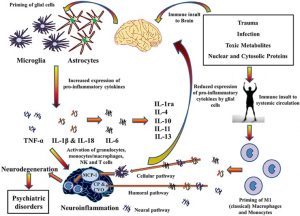Treatment of Alzheimer’s & Dementia
Here at Trillium Functional Medicine, we are working with patients on cognitive changes and dementia. This is an individualized approach where the root causes of cognitive decline and dementia are sought after. We work with you to evaluate the underlying causes of dementia including:
- Insulin resistance
- Inflammation/infections
- Hormone, nutrient, and trophic factor optimization
- Toxins (chemical, biological, and physical)
- Restoration and protection of lost (or dysfunctional) synapses

Three types Of Alzheimer’s Disease
Dr. Dale Bredesen classifies 3 types of Alzheimer’s disease. Some patients have one or more of these types. Treatments are tailored based off presentation, symptoms and test results.
Type 1 Inflammation
Anything that causes inflammation to the brain, examples in the list below, can contribute to Alzheimer’s Disease (AD):
- AGEs
- ApoE3/4
- Diet High in Lectins
- Imbalances in fatty acids (omegas)
- Infections
- Insulin Resistance
- Leaky Gut or Leaky Blood Brain Barrier
- Neuroinflammation
- Toxins (incl metals)
Type 1.5 Glycotoxic
Glycotoxicity comes from an imbalance of insulin and glucose in the brain. The pancreas produces Insulin Degrading Enzyme (IDE, the enzyme that breaks down insulin) to break down amyloid beta. If IDE is used up by a diet too high in sugar then there is none left to break down amyloid beta.
This type of AD is called 1.5 because it is a combination of AD 1, inflammation and AD 2, trophic loss. Having high amounts of glucose in the blood creates inflammation, and having improper usage of insulin, degrades insulin’s ability to break down amyloid beta.
Type 2 Metabolic/Trophins Loss
This type of AD is usually caused by imbalances in the bodies hormones and nutrient depletion, as well as neurotropic loss (brain breaking down faster than it can regrow).
This includes:
- ApoE4
- Hormone Imbalances (Vitamin D, Sex and Neuro Steroids, Thyroid)
- Insulin Resistance
- Methylation Problems
- Mitochondrial Damage
- Neurotrophic Loss (atrophy in brain)
- Nutrient Depletion
Type 3 Toxins/Infections
This type is caused either by exposure to toxins or infections.
- ApoE3
- Heavy Metals (including dental amalgams)
- Infections (such as mold, Lyme, HSV, active EBV, oral/nasal/gut dysfunction)
- Low Zinc/high copper ratio
- Psychiatric disorders (correlation)
- Toxins
We can work with you to get comprehensive testing if appropriate and develop an individualized treatment plan to reverse cognitive decline that may have already occurred or to prevent progression when the very first symptoms occur. We have also worked with patients with a strong family history of dementia to examine their genetics and evaluate their predispositions to a specific type of dementia and work to prevent onset.
